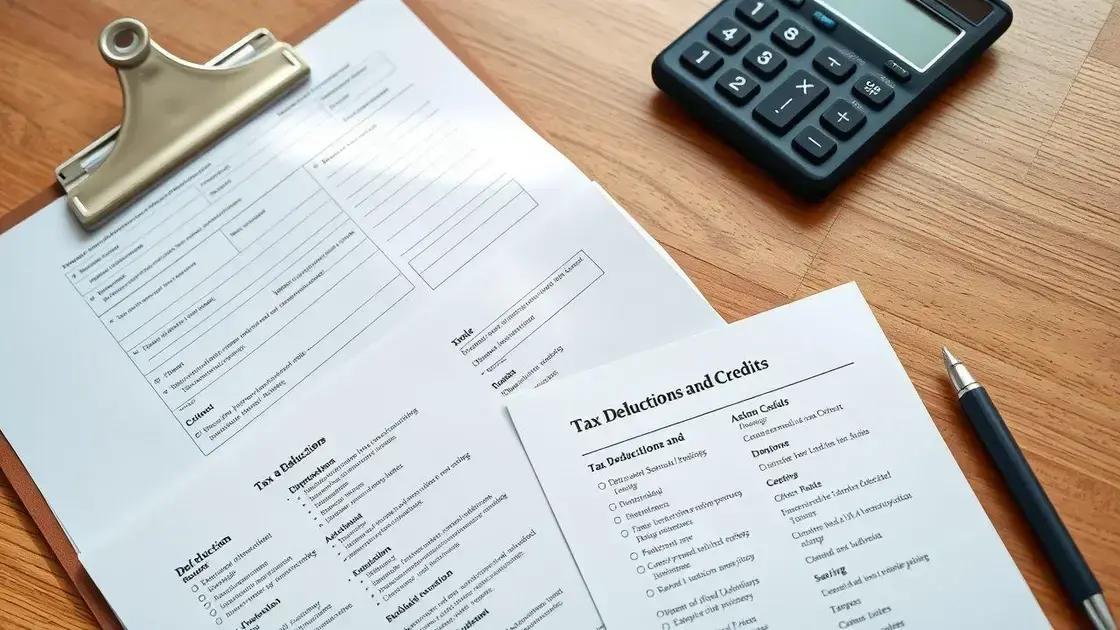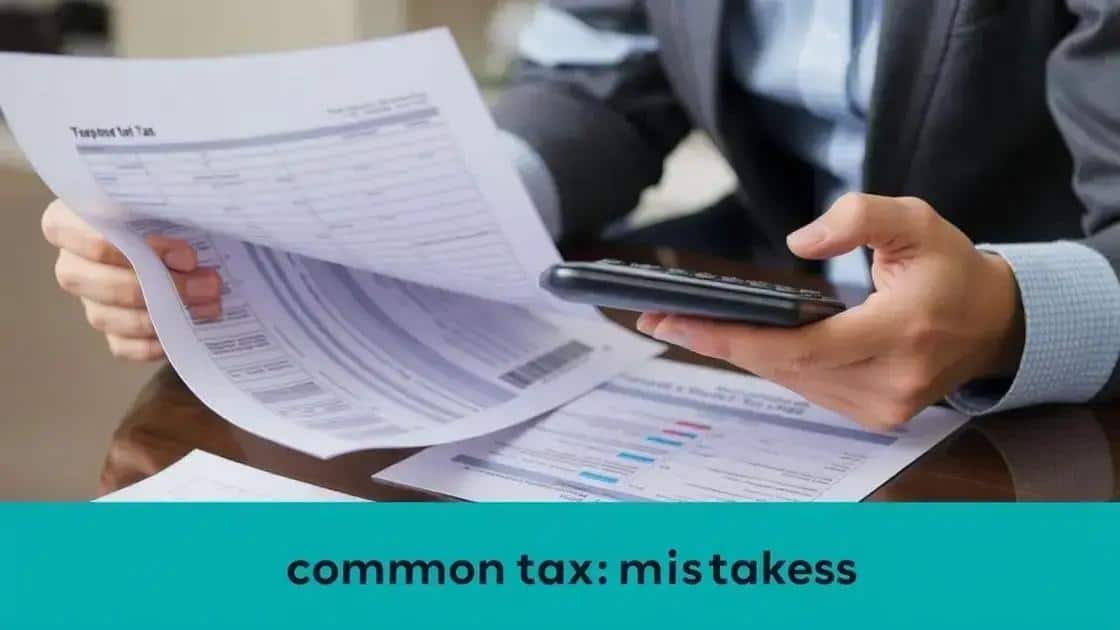Month tax saving strategy: tips you need to know

Implementing a month tax saving strategy involves organizing financial documents, maximizing deductions, identifying tax credits, and avoiding common mistakes to ensure significant savings during tax season.
If you’re looking to cut down on your tax bill, implementing a month tax saving strategy could be the game changer you need. Have you considered how minor adjustments can lead to significant savings? Let’s dive into effective tactics that can potentially enhance your financial situation.
Understanding month tax saving strategies
Understanding month tax saving strategies is crucial for anyone looking to reduce their tax liability effectively. By employing specific techniques during the month leading up to tax day, you can take advantage of various deductions and credits. This approach can help you save a significant amount.
Key Strategies to Consider
One of the first steps in developing your month tax saving strategy is to evaluate your current financial situation. This means looking at all income sources, expenses, and any potential deductions you might qualify for.
Here are a few strategies to consider:
- Maximize contributions to retirement accounts.
- Keep track of all eligible expenses and receipts.
- Consult with a tax professional for personalized advice.
- Consider pre-tax health savings accounts.
Additionally, it’s wise to review any available tax credits that might apply to you. Many people do not realize the extent of the benefits they can receive simply by being proactive. A small change today can lead to bigger savings tomorrow.
Organizing Your Financial Documents
Keeping your financial documents organized is another critical element of tax saving. By maintaining an orderly system, you can ensure that you don’t miss important deductions.
Focusing on these fundamentals allows you to create a clear picture of your financial health. Maintaining a comprehensive list of all relevant documentation simplifies the process when it comes time to file your taxes.
Also, consider opportunities for deductions that arise from unique life circumstances, such as moving for a job or expenses related to education. Each of these can significantly affect your tax situation and potential savings.
Top deductions and credits for the month

Exploring the top deductions and credits for the month can significantly impact your overall tax savings. Knowing what to look for allows you to maximize your return effectively and responsibly. Each of these deductions can play a vital role in reducing your taxable income.
Common Deductions You Should Consider
Many taxpayers may overlook key deductions that can save them money. Here are some of the most common ones:
- Mortgage interest deduction for homeowners.
- Medical expenses exceeding 7.5% of adjustable gross income.
- State and local taxes paid up to $10,000.
- Charitable contributions made throughout the month.
Additionally, you should keep track of expenses related to your job. This might include supplies, mileage, or home office expenses. Items like these can add up quickly, contributing to your overall deductions.
Credits That Can Boost Your Savings
Credits directly reduce the amount of tax you owe, which makes them incredibly valuable. The following credits are worth considering:
- The Earned Income Tax Credit (EITC) for low- to moderate-income workers.
- The Child Tax Credit that supports families with children.
- Education credits, like the American Opportunity Credit.
- Energy efficiency credits for making green home improvements.
Familiarizing yourself with these credits enables you to maximize your potential savings. It’s crucial to assess your eligibility and gather all necessary documentation. By doing so, you ensure you can take full advantage of these opportunities throughout the month.
Another aspect to consider is how timing can affect your deductions and credits. Making eligible purchases or donations within the month can help you prepare for filing your taxes more effectively. Always review your options before tax day approaches to make informed decisions.
Planning your finances for tax savings
Planning your finances for tax savings is essential for making the most out of your financial situation. An effective plan can help you achieve significant savings come tax season. Understanding how to organize your finances allows you to take advantage of various opportunities that minimize your tax liability.
Getting Organized
The first step in successful financial planning is getting organized. Start by gathering all necessary financial documents, including pay stubs, receipts, and bank statements. Organizing these documents helps you identify where you stand financially and what potential deductions you might qualify for.
- Track all eligible expenses throughout the month.
- Maintain records of charitable donations.
- Document any job-related expenses that may be deductible.
- Keep receipts for medical expenses that exceed the standard deduction.
Having everything in one place will simplify the process when it’s time to file taxes, ensuring you take advantage of all available deductions and credits.
Creating a Budget
Establishing a budget can play an important role in enhancing your tax savings. Make a monthly budget that allows you to control your spending and set aside money for savings or investment. This not only helps in day-to-day management but also makes you aware of where your money is going.
By planning for future expenses and potential tax liabilities, you position yourself to make informed decisions throughout the month. For example, if there are large purchases or charitable donations you’re planning, timing them appropriately can increase your deductions. Knowing what your taxable income will likely be at year-end allows you to adjust your decisions accordingly.
Finally, review your financial situation regularly. Keep an eye on changes in your income and expenses, which can affect your tax strategy. Adapt your planning as needed to maximize your tax savings throughout the year.
Common mistakes to avoid during tax season

Avoiding common mistakes during tax season is essential for maximizing your tax savings. Many taxpayers make simple errors that can lead to missed deductions and credits. Being aware of these pitfalls can save you time and money.
Neglecting to File on Time
One major mistake is failing to file your taxes on time. Late filings can incur penalties and interest, which will only increase your financial burden. To avoid this, set reminders ahead of the deadline.
Plan your tax preparation in advance, gathering all necessary documents and seeking assistance if needed.
Missing Important Deductions
Another common error is missing out on valuable deductions. Many taxpayers are unaware of all the available deductions that could benefit them. Some important ones include:
- Home mortgage interest.
- Student loan interest payments.
- Charitable contributions.
- Medical expenses if they exceed 7.5% of AGI.
Keeping detailed records throughout the year can help ensure that you don’t overlook these opportunities. Always double-check to include all potential deductions when preparing your return.
Incorrect Personal Information
Another common mistake occurs when taxpayers input incorrect personal information, like Social Security numbers or bank account information. Such errors can lead to major delays in processing your tax return.
Take time to review all your details before submitting your return. Double-check your name, address, and any other personal information to ensure it is accurate.
Finally, consider utilizing tax preparation software or consulting a tax professional. Having expert guidance can help navigate the complexities of your tax situation, reducing the risk of mistakes.
In conclusion, understanding and implementing effective tax strategies can lead to significant savings. By avoiding common mistakes, taking advantage of deductions and credits, and carefully planning your finances, anyone can navigate tax season with confidence. Remember to stay organized, keep detailed records, and consult a professional if needed. Following these steps can ensure you are on the right path to maximizing your tax savings each year.
FAQ – Frequently Asked Questions about Month Tax Saving Strategies
What are some common mistakes to avoid during tax season?
Common mistakes include failing to file on time, missing important deductions, providing incorrect personal information, and neglecting to double-check your return.
How can I identify tax deductions I may qualify for?
Keep track of all eligible expenses throughout the year, such as medical expenses, mortgage interest, and charitable contributions.
Why is it important to stay organized with financial documents?
Staying organized helps you easily access important documents, ensures you don’t overlook deductions, and makes the filing process smoother.
Should I seek professional help for my taxes?
If you’re unsure about your tax situation or feel overwhelmed, consulting a tax professional can provide valuable guidance and help maximize your savings.






